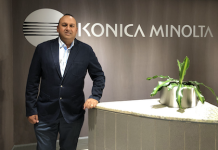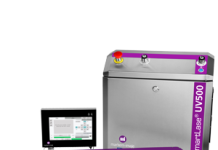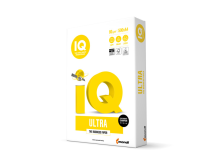
Druckhaus Müller OHG’s product portfolio includes typical commercial jobs and small, folded inserts for confectionery packaging. Weekly and monthly periodicals are a further focal point. From the time the data is received right through to the point the end product is ready for shipping, everything takes place in-house using production technology and software from Heidelberg, which the company has invested in.
Druckhaus Müller OHG is based in Langenargen on Lake Constance in Germany. Founded by Josef Müller in 1978, this second-generation family business is now run by his sons, Marius and Pius.
‘Druckhaus Müller and Heidelberg have enjoyed a close partnership for decades. The print shop has regularly invested in new technologies to ensure it remains competitive,’ said Mirco Klumpp, who is responsible for sales and customer service at Heidelberg.
Druckhaus Müller OHG invested in two fully automated Stahlfolder KH 82 combination folding machines, each with four buckle plates, a cross-fold unit and a pallet feeder. They replaced an existing folding machine of the same model type and a Stahlfolder KH 78. The investment also included a Polar N 115 PRO HD cutting system, complete with all the peripherals for supporting layer and pile logistics.
By modernising the folding technology and moving to a standardised infeed width, Druckhaus Müller has significantly improved its production flow. ‘Previously, we often had to interrupt long runs on the KH 82 because of urgent, smaller jobs. That created a great deal of makeready work and had a very detrimental effect on the net output of the folding process,’ said Pius Müller.
A further factor to consider is that the timeframes for some periodicals are very tight. The final data arrives at the print shop at 4pm and the finished products need to be ready for shipping at 9am the next morning. Reaching production speed quickly and ensuring a stable process throughout all stages of production are an absolute must. ‘Our ability to deliver on time is one of the strongest sales arguments we can offer our customers,’ insisted Marius Müller.
Druckhaus Müller has created the prerequisites for this with its latest investment. One of the combination folding machines is largely reserved for the longer runs, while the smaller jobs are completed on the second machine. Using the control terminal to set up the Stahlfolder technology is a quick and easy process. Servomotors adjust the folding rollers, buckle plates, and cross-fold unit to the required dimensions fully automatically. The faster makeready processes have a particularly positive impact on productivity in the case of short runs, the number of which is growing strongly. ‘The two new folding machines are around 35 percent more productive than our previous folding technology,’ confirmed Marius Müller. The increased output means the company now has the in-house capacity to boost added value by handling jobs that it previously had to outsource.
‘When it comes to productivity, postpress remains a bottleneck at many print shops. The latest-generation Heidelberg folding machines can be integrated into the Push to Stop concept for autonomous printing and significantly boost the productivity of the overall process,’ said Stefan Dettke, Head of Postpress Commercial at Heidelberg.
HEIDELBERG GRAPHIC SYSTEMS SOUTHERN AFRICA
+27 86 142 4756
warren.jones@heidelberg.com
www.heidelberg.com/za




















